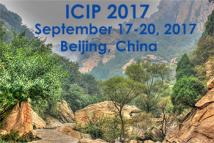
The International Conference on Image Processing (ICIP), sponsored by the IEEE Signal Processing Society, is the premier forum for the presentation of technological advances and research results in the fields of theoretical, experimental, and applied image and video processing. ICIP has been held annually since 1994, brings together leading engineers and scientists in image and video processing from around the world. Visit website.
- Read more about Automated 3D Muscle Segmentation From MRI Data Using Convolutional Neural Network
- Log in to post comments
- Categories:
 8 Views
8 Views- Read more about Automated 3D Muscle Segmentation From MRI Data Using Convolutional Neural Network
- Log in to post comments
- Categories:
 3 Views
3 Views- Read more about Automated 3D Muscle Segmentation From MRI Data Using Convolutional Neural Network
- Log in to post comments
- Categories:
 16 Views
16 Views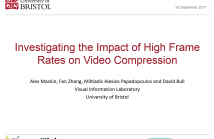
- Read more about Investigating the Impact of High Frame Rates on Video Compression
- Log in to post comments
- Categories:
 16 Views
16 Views- Read more about MULTI-OBJECT TRACKING BY VIRTUAL NODES ADDED MIN-COST NETWORK FLOW
- Log in to post comments
- Categories:
 19 Views
19 Views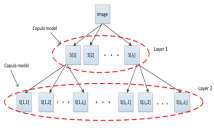
- Read more about DEEP DECOMPOSITION OF CIRCULARLY SYMMETRIC GABOR WAVELET FOR ROTATION-INVARIANT TEXTURE IMAGE CLASSIFICATION
- Log in to post comments
We propose Deep Decomposition of Circularly Symmetric Gabor Wavelet (DD-CSGW) for rotation-invariant texture image classification. Circularly Symmetric Gabor Wavelet (CSGW) is rotation-invariant tool for image analysis. However, CSGW has an obvious shortcoming: it extracts less discriminative information from image due to lack of directional selectivity.
- Categories:
 10 Views
10 Views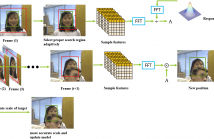
- Read more about Comp-LOP: Complex Form of Local Orientation Plane for Object Tracking
- Log in to post comments
In this paper, we propose complex form of local orientation plane (Comp-LOP) for object tracking. Comp-LOP is a simple but effective descriptor, which is robust to occlusion for object tracking. It effectively considers spatiotemporal relationship between the target and its surrounding regions in a correlation filter framework by the complex form, which successfully deals with the heavy occlusion problem. Moreover, scale estimation is performed to treat target scale variations for improving tracking accuracy.
- Categories:
 23 Views
23 Views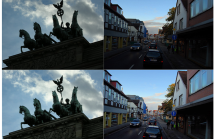
- Read more about Naturalness-Preserved Tone Mapping in Images Based on Perceptual Quantization
- Log in to post comments
In this paper, we propose naturalness-preserved tone mapping in images based on perceptual quantization (PQ). PQ is a transfer function based on Barten's contrast sensitive function (CSF) which represents human visual perception on luminance, and we adopt it to generate a limit curve for perceptual contrast enhancement. First, we obtain a limit curve in an image based on PQ transfer function to adjust the degree of contrast enhancement. Second, we redistribute the histogram using the limit curve and achieve perceptual contrast enhancement.
- Categories:
 44 Views
44 Views- Read more about ICIP 2017 Paper #2679: THE DIVISIVE NORMALIZATION TRANSFORM BASED REDUCED-REFERENCE IMAGE QUALITY ASSESSMENT IN THE SHEARLET DOMAIN
- Log in to post comments
Reduced-reference (RR) image quality assessment (IQA)metric aims to employ less partial information about the original reference image to achieve higher evaluation accuracy. In this paper, we propose a novel RRIQA metric based on the divisive normalization transform (DNT) in the discrete nonseparable shearlet transform (DNST) domain.
- Categories:
 9 Views
9 Views- Categories:
 5 Views
5 Views